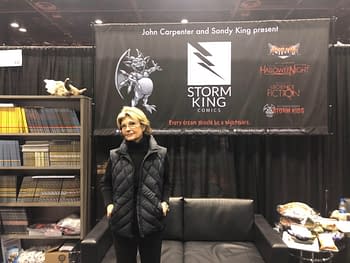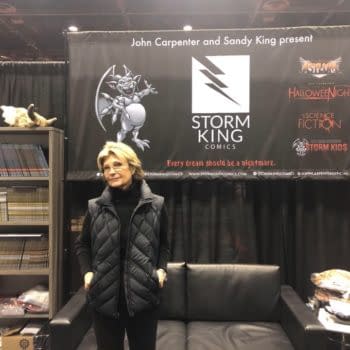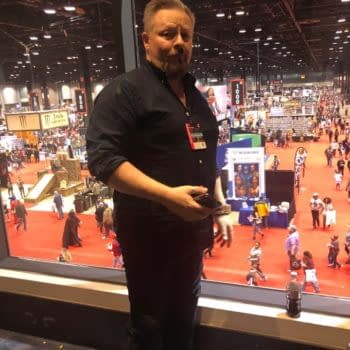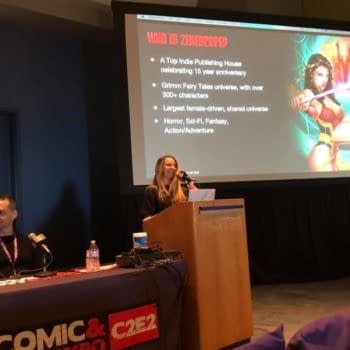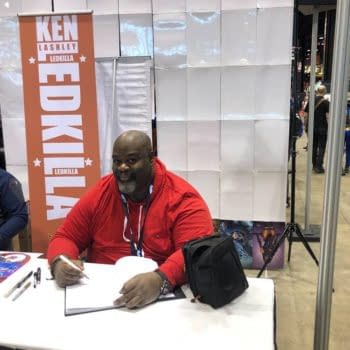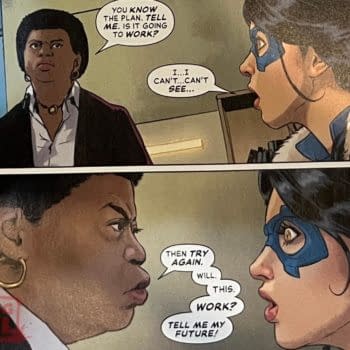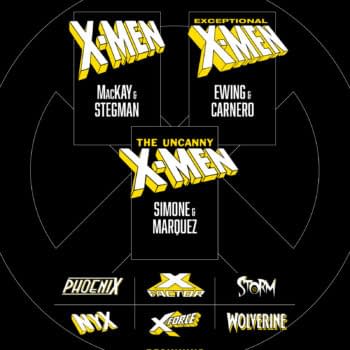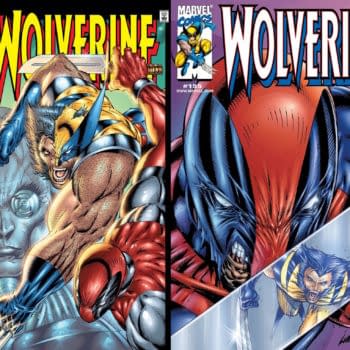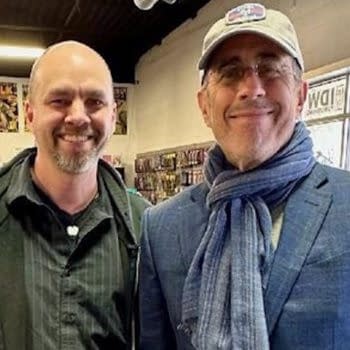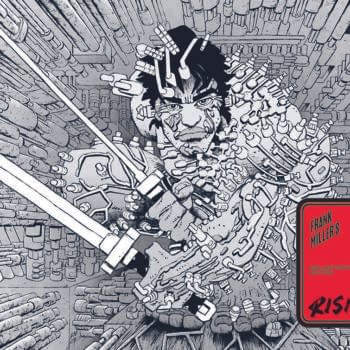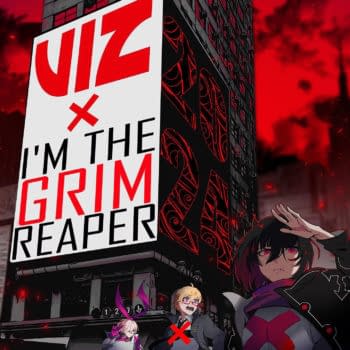Posted in: Comics, Comics Publishers | Tagged: halloween, horror
Interview: Sandy King Carpenter on Storm Kids and Allegory of Horror
On Sunday, March 1st, at C2E2 2020, I caught up with Sandy King Carpenter. She's the wife of the legendary filmmaker John Carpenter, the producer of John Carpenter films such as They Live and the CEO of Storm King Comics. I talked to her about her new Storm Kids comics with a younger audience in mind, social commentary in comics/movies and how she first got involved in the business of publishing horror comics.
Bleeding Cool:
So, tell me about yourself.
Sandy King Carpenter:
Well, I'm the CEO of Storm King Productions and a subdivision of that is Storm King Comics. So, I produce our movies and television shows and I am the editor of Storm King Comics. So that includes creating some of the comics, includes editing all of the comics and getting into print and getting them out.
Bleeding Cool:
How does a typical comic get made at Storm King Comics?
Sandy King Carpenter:
Well, the first thing that happens is story submissions. So various writers, I either find a writer and we talk about the various divisions between our yearly anthology of Tales for a HalloweeNight, which has short stories of 13 pages or under. And that's a compilation of 12 stories – it's a box of chocolates of horror each year. First story's always by John. Last story's always by me. And in between, it's people like Duane Swierczynski and David J. Schow and Jimmy Palmiotti and Frank Tieri and Amanda Deibert and, you know, just really cool people. All different artists. Or it's Tales of Science Fiction where again, we have a wide variety of writers and those come out monthly, and then are collected into trades. So, we have Joe Harris writing Surviving Nuclear Attack and Duane Swierczynski writing Twitch. Steve Niles. David J. Schow wrote The Standoff. James Ninness wrote Vault.
I created Vortex, the characters and story. But Mike Sizemore wrote it because he has more time. And he's a better writer than I am. [Laughs]. So, we have those and now we're launching Night Terrors, which will be for the longer horror stories that don't fit in Tales for a HalloweeNight. So, those would be mostly graphic novels.
And now we're launching Storm Kids. And those will be different tales, mostly of horror, some are science fiction. There'll be little ones for ages five to eight. There's a Grimstone Terror by Neal Edmunds. It's going to be for 8 to 12. We've launched our first YA by Steve Niles, a Monica Bleue werewolf story and coming soon is Louise Simonson's Sci-fi story Hyperbreed.
Bleeding Cool:
Can you tell me more about Storm Kids?
Sandy King Carpenter:
I didn't see what I thought was horror that wasn't just horror that had the sex and blood taken out – and now it was suddenly "kid" horror. I felt that we could bring the same quality we bring to our adult books to age appropriate steps.
So, Young Adult was interesting because I could bring in someone like Steve Niles who created 30 Days of Night and Criminal Macarbre. And then he did Monica Bleue, which has a young girl who has lost her mother, the father decides to move her from the city to the country and she's angry. And so we've got teen angst and she's pissed off, and then she's trying to tell her father that something's happened to her and she's describing the werewolf. Of course, he doesn't believe her because she's already angry. And it goes from there.
Simonson has written this great, sci-fi, Galaxy Quest kind of thing. It's got great adventures and battles in outer space that's again suited for that age group. But then I met Neal Edmund, who writes Power Rangers and he did this great Grimms Town Terror, which is perfect for perfect for the 8 to 12 year olds. I have two words for you: booger troll. Now how can you go wrong with a booger troll? But that one has art by Renee Deleese who usually does these beautiful fairytale drawings. It's just a gorgeous book. And I think that'll appeal to that age group that's got demons and monsters and things and these two kids that have to try to find their parents. And then the younger one, which doesn't have its title yet, but a friend of mine, Jeff Balke has a comic that's on the internet with Stanley the Squirrel. And I asked him to do a one shot for Halloween that would be reminiscent of have we had Huey, Dewey, and Louie at Halloween with Duck Tales. I said, give me Stanley and his friends who have something scary and spooky going on, on Halloween. And we now have Ghost Bunnies. So, that's for the little kids.
And what I'm hoping is we have age appropriate scares and fun. That's right for those right ages, so they get their own books, not dumbed down with great art and great storytellers.
Bleeding Cool:
Yeah, I mean, for me goosebumps was what got me into horror.
Sandy King Carpenter:
Yeah, and goosebumps is great.
Bleeding Cool:
It's important to get kids into comics if you want this industry to survive, in my opinion. And it can create a lifelong love of horror if you do it right.
Sandy King Carpenter:
It can create a lifelong love of reading.
Bleeding Cool:
That's true, too.
Sandy King Carpenter:
And the comic shops, I think are a great gathering place for families. And they've got their game nights and they've got their new Comic Book Day. And I would love to see them have it where the whole family can go in and everybody in the family can get a new comic book. And if I can help that out and the older kids get their stuff, the younger kids get their stuff and dad gets his things and mom… I think that's a great notion. And I want to make the comic shop owners happy that I've given them a quality product. And I want the families happy that they spent their money on something that was gratifying.
Bleeding Cool:
How'd you get involved in the comic book industry? John Carpenter is a film maker and is that related?
Sandy King Carpenter:
Well, our fans, genre fans, cross into gaming, television, movies and comics. They're in all of that. And people would come to John for years wanting to put his name on comic books and they weren't always great comics. So, it's not a great idea if you want your brand to matter, you want the quality here. They're used to: if they spend their money on a John Carpenter movie, it's a good movie. And so, we kind of avoided it. And then we had a project that we always do a lot of artwork when we're presenting anything, whether it's a series or a movie, and we're doing the pitches for it. And this one story just really was visual and the town was Los Angeles because Lucifer was coming through in the City of Angels. It's kind of a joke. And LA had to be the city because in the summer it looks like hell on earth with the Santa Ana winds and embers flying through the air.
And I was trying to explain this to a studio where we were maybe going to do a TV series of it. And this under assistant developers said, "Oh, well it's not like it's a graphic novel and we're matching anything". And I said, "You know what, actually it is". And I had agents kicking me under the table and various things and I go home and John says, "So how did it go?" And I went, "Great, we're doing a comic book". He said, "What do we know about comics?" And I say, "Absolutely nothing, but we'll learn".
And so we spent two years stopping and learning the business of comics and the differences between screenwriting and comic book writing and great people like Bruce Jones and Tim Bradstreet is Steve Niles and Jimmy Palmiotti and all these people who we crossed paths with. Because you're around the conventions and when you're promoting movies and all these other things happen. But they were so generous with their time and advice, that we learned how to make comics because it's like people saying, "Oh, I could make a movie I've seen a lot of them". Well, we'd read tons of comics, our kids were always going to the comic shops and we had long boxes all over the place. But that doesn't mean you know how to make a comic. So, we learned, and we just had great mentors.
Bleeding Cool:
So how involved is John in the company today?
Sandy King Carpenter:
Well, he writes the first story every year in the anthology. I always write the last story. He sees every single piece that comes in. When I have doubts, he decides whether we're doing certain stories. You do know he wrote Big Trouble in Little China for Boom. And the crossover with Old Man Jack and Snake Plissken, so he's written those. He wrote the Year of the Villain: Joker for DC. So, it's not like he doesn't do comics. Everything we do, we do together. So this work, the comics come out of our same office as our TV and movie projects. You can't avoid the stuff coming in and going out and even us packing for the conventions. They'll fall over the boxes. So he's involved.
Bleeding Cool:
That's awesome. So, it sounds like you guys are putting comics on the map a little bit more, actually. Would you say that's accurate?
Sandy King Carpenter:
I don't know how important we are. I just know we try and show people a good time.
Bleeding Cool:
I love the movie They Live and it has a lot to say about society, culture, governments and capitalism. And how much social commentary is there in these comics for the most?
Sandy King Carpenter:
You try never to preach. Like I said, horror is allegorical. Every once in a while, particularly with Joe Harris, I allow some stories to be told that maybe other publishers wouldn't, because I think it's important to keep talking. I believe in social justice. I believe in the environment. I believe that certain things need to keep being repeated or They Live wouldn't still be so relevant. That being said, just like They Live is a fun action movie. I expect us to entertain at the same time. So, we don't preach, but there are certain messages that are allowed to be said. I will never overload the anthology with too many messages. But Surviving Nuclear Attack is a really great book. It's got some real undertones of 1950s paranoia combined with some good-old-fashioned, current "what is the government doing?" A bunker-style mentality. It's fun, so there's a little bit of that kind of stuff in it. But I don't do straight up politics because, I think that defeats the entertainment. But if you want a little They Live edge, I will never stop doing that.
Bleeding Cool:
Tell me about Redhead.
Sandy King Carpenter:
Redhead is a Duane Swierczynski story. Jason Felix art. And it's a girl who wakes up with an affliction that she turns into an asset of vengeance. So, it's got some empowerment to it. Big action, science fiction, real engaging.
Bleeding Cool:
What do you love about comics?
Sandy King Carpenter:
I love the range of storytelling we can do. I love the range of talent I can bring together. It's movie making with minimal risk. I can work on any budget. We can do things that would cost hundreds of millions of dollars and is still the same amount of money on the page. Because you can go wherever your imagination can take you. So, it's really fun because we're storytellers at heart, and we can dream up anything and put it on the page and take you anywhere. So, that's what I think is so much fun in making comics. I love to see people, particularly in a city like Chicago where there's real readers, and they'll come back and they'll either get mad at me because I killed the priest.
When asylum was in single issues, I had a guy that came and bought issue one. And then he read it on a break from when he was resting his feet and having coffee. He came back and bought issue two, read that at lunch, came back, bought issue three, came back the next morning, "Said you killed the priest!" And I went, "I'm sorry", and he goes, "What's going to happen next?" I said, "You better buy issue four". And that to me is the most fun of making comics, having the immediate feedback. When we make a movie, we spend say a year just to round it out, and then you don't really hear back from the fans. And I don't count social media because everybody's just ranting and going crazy. But you really don't have the immediacy of telling the story and hearing back from someone else on the table. So, it's a lot of fun.
Bleeding Cool:
How involved is this company in the convention scene? How important are conventions to your brand and your business?
Sandy King Carpenter:
Well, they're a marketing tool. They're an awareness tool, you don't go there to make money really. I mean, you hope to make enough money meaning maybe to pay for the booth or to pay your flights or do whatever. But really, they're for awareness. So there to, again, to kind of help out so that fan's going by going, "I didn't know John Carpenter made comics", even though we've been around now for, like, six years. But in this economy, in the changing and closing of comic shops, in the fact that, say Barnes & Noble now carry trades and things like that, they just help people know you're around. So, I try and do comics in different areas of the country throughout the year. I'll do, say, San Diego and Emerald City up in Seattle and Chicago and Philly and New York. And I'm going to do Denver for the first time this year, just so that there's a word of mouth. And I talked to people like you and different local press. And it's really about marketing. It's about presentation. And that's the big function for me. I don't do all the conventions all year like artists who do Artist Alley and that kind of thing. It's really just to have awareness of it.
Bleeding Cool:
So are there any announcements that you want to make – or have already been announced and you can just repeat it to me?
Sandy King Carpenter:
Well, I think basically the things I've just told you, which is that, yes, Storm Kids is rolling, and it's going to keep on rolling, and we're going to make sure we have a decent library for all ages. Meaning, not that all comics are all ages, but we'll have some specific things for every age. And no, we're not abandoning our core audience, which is grownups and horror. Even the stuff for little kids will be their version of horror so they feel like they're kids. And we're going to keep on with the science fiction. And we're not going away.
And yes, John will tour again probably next year. And yes, he's scoring the new Halloween. And yes, it's going to rock. And yes, there's a new album of originals that will be out next year. All of it's happening.
Bleeding Cool:
Awesome. Thank you for your time.
